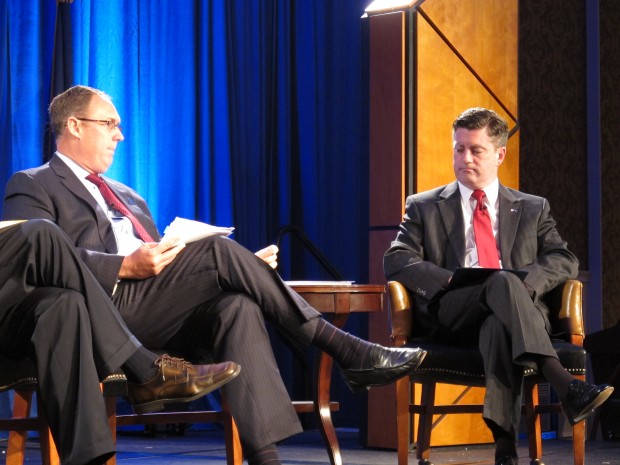Township Supervisors Have Questions About Impact Fee
-
Scott Detrow

Scott Detrow / StateImpact Pennsylvania
Lieutenant Governor Jim Cawley and PUC Chair Rob Powelson Talk Act 13 At PSATS’ Conference
The new natural gas-drilling impact fee puts a lot on township supervisors’ plates. It injects tens of thousands of dollars — in some cases, more than $500,000– into their budgets. And if the township has drilling regulations on the books, the new statewide law will change them.
So, when the Pennsylvania State Association of Township Supervisors’ annual conference scheduled two sessions on what Act 13 means for townships, people came armed with questions.
Township Supervisors Have Impact Fee Questions
Most of the queries were like Stephen Merrill’s: they had to do with money. “What the limitations are on what we can use the money for,” the Litchfield Township, Bradford County Supervisor, said he wanted to learn. “How [the money is] going to be dispersed to the municipalities, and what are the predictions on, after this year, how much the townships can expect to get.
The fee is based on “spudded” – drilled – wells. Litchfield hosts 15. Merrill expects his township to receive about $350,000 from the fee this year, and said he’s already making plans for how to spend it. “Most of our roads are dirt roads. And we need a lot of work to build a new base in those roads. So that will disappear in a hurry. We couldn’t do some of these projects without that money, but it will disappear.
There are more than 60 spudded wells (More than 50 are producing gas) in Chartiers Township, Washington County, where Richard Metzler is a supervisor. “We’re going through a process of planning,” Metzler said, when asked how his community would spend the money. Road expenditures would be prioritized, “because our roads need upgraded. We have a community center that leads a little additional funds to be completed. And we hope to pay down some debt on infrastructure.”
Can Metzler use fee revenue to pay off debt? That was one of the questions addressed during the two impact fee-related sessions hosted by state officials. Lieutenant Governor Jim Cawley thought the answer was no, but Public Utility Commission Chairman Rob Powelson corrected him. “I did ask for an opinion yesterday. And if it is within the bucket of 13 different designated areas, it is OK,” he explained.
The law lays out specific requirements for what townships can spend money on. Road-work, public safety, rent stabilization — areas directly impacted by drilling — are all OK. When Powelson talked to StateImpact Pennsylvania in February about how the PUC would police the requirements, he said the commission would be aggressive about making sure money is spent in the right places.
But another PUC Chair, Pamela Witmer, told supervisors the oversight won’t be too strenuous. “All we’re going to be asking for is, tell us what it is you’re going to spend [money] on.
We’re not going to be proactively going out and auditing the use of the information. From our perspective, if it’s one of the 13 eligible categories, that’s it.
Powelson said the same thing when he spoke to the conference. Townships will need to fill out a form – nothing more. But he pointed out communities will still need to follow the rules. “If there is a discrepancy, in terms of, you spent the money outside of the 13 designated areas, we’re obligated to let the Attorney General or the Auditor General know that,” he said.
But Powelson and Witmer didn’t have the answer to the question every township supervisor wanted to know: Will that partial injunction — the one delaying the law’s local zoning restrictions from going into effect — hold up delivery of impact fee payments?
“We’re really not sure how we’re going to be dealing with those issues yet,” said Witmer. “I hate not to be able to answer your question, but I can’t.
“I hate to punt here,” said Powelson during his session, “but I cannot comment at this time.”
The PUC has complained the injunction is too vague on what the commission can and cant do before the full law goes into effect. If a township’s drilling zoning goes beyond the new statewide guidelines, it can’t receive impact fee money.
If the commission can’t review ordinances yet, how does it know whether townships are eligible to receive the money? That’s the question Powelson, Witmer and the rest of the commission are trying to answer, as they work to get those checks to townships by December 1.
















